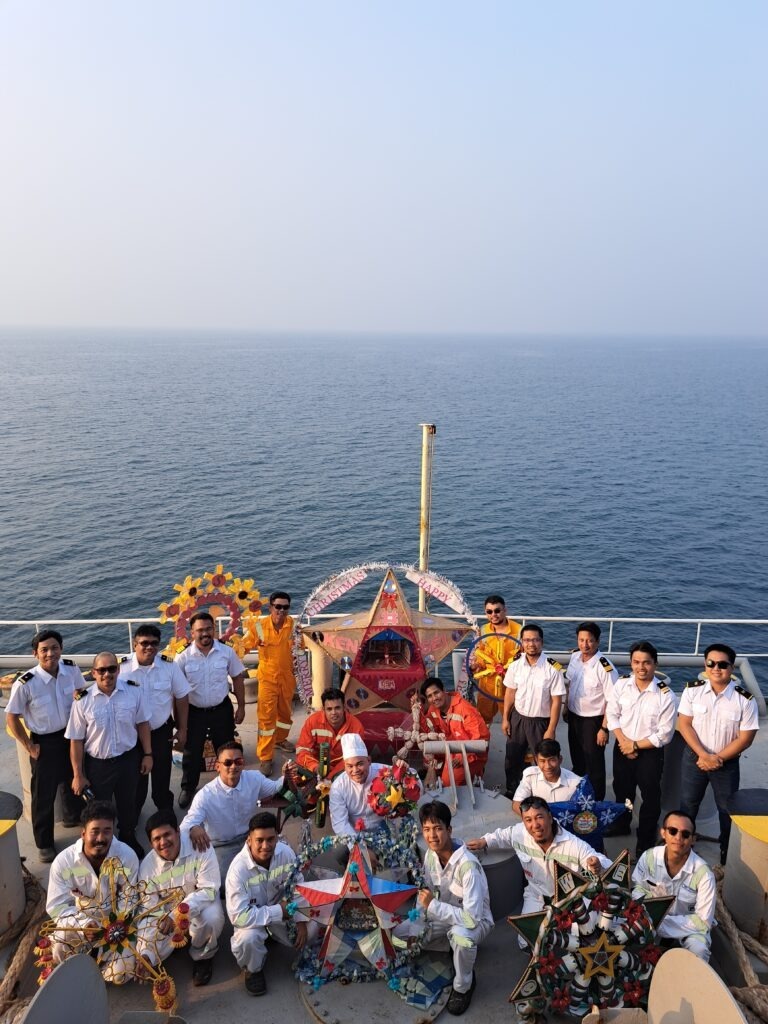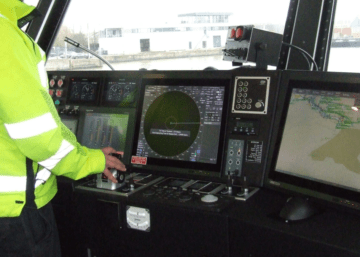
How do you come up with the ideas for your activities on board?
I generate ideas for onboard activities through careful planning prior to joining the vessel. Drawing from my experience in organising events, I find it easier to adapt these ideas for shipboard activities. My primary focus is on investing in the happiness and joy of the crew, as I believe that a happy crew leads to a safer ship. It is my responsibility to create a positive and secure working environment, contributing to the overall success of the company. I firmly believe that happiness is the key to enhanced productivity.
Not everyone is always willing to participate in activities. How do you motivate your crew to take part?
Motivating the entire crew to participate in activities can be challenging, as not everyone may be willing to join. To encourage their participation, I organise fun events that foster interaction and bonding among the crew. Building trust and respect is crucial, so I lead by example and demonstrate trust in my team. I emphasise the importance of trusting the process and the system we are building together.
Many crew members may have had negative experiences with demanding management on previous ships, where they were constantly pressured to achieve high work outcomes and faced criticism if they fell short. To break that cycle, I strive to create a work environment free from excessive pressure and tension. I encourage them to take breaks and actively participate in our activities.
People want to feel trusted and valued, and granting them responsibilities shows that we have confidence in their abilities. When they feel good about their work environment, they can better focus on their responsibilities, leading to increased trust in management. Additionally, I invest in my team’s personal and professional growth, which further motivates them to engage in activities and contribute to the overall success of the ship.
Lastly, I find that offering rewards or prizes, even simple items like toothpaste, shampoo, or chocolates, can be effective motivators. It’s not about the value of the rewards, but rather the gesture itself that shows appreciation and recognition for their participation.
By implementing these strategies, I aim to create a positive and inclusive atmosphere where crew members feel motivated and eager to take part in onboard activities.

Is there a Captain or superior that you admire? Why do you admire them?
I have had the privilege of working with several captains of different nationalities throughout my career, and each of them has served as a valuable mentor to me. While no captain is perfect and they all have their flaws, I choose to focus on the positive aspects and extract valuable lessons from their management styles. I admire captains who possess certain qualities such as strong leadership skills, effective communication, and the ability to make sound decisions under pressure.
One captain, in particular, stands out to me due to their exceptional ability to inspire and motivate the crew. This captain had a clear vision for the ship, communicated it effectively, and encouraged teamwork and collaboration among the crew members. They demonstrated a genuine care for the well-being and professional growth of the team, and they consistently led by example.
Overall, I admire captains who exhibit strong leadership qualities, effective communication, and a genuine concern for their crew. By observing and learning from their strengths and weaknesses, I continuously strive to become a better leader myself.
What is an important trait for a seafarer to have in your opinion?
1. Leadership: Inspirational leaders who can motivate and guide their team members are crucial in the maritime industry. Effective leadership fosters a positive work environment and contributes to the overall success of the vessel.
2. Self-awareness: Being self-aware allows seafarers to understand their strengths, weaknesses, and emotions. It helps them navigate challenging situations, make informed decisions, and continuously improve their skills.
3. Strong work ethic: A strong work ethic is essential for seafarers, as it involves dedication, professionalism, and a commitment to perform their duties to the best of their abilities. It ensures the smooth operation of the vessel and contributes to a strong work culture.
4. Punctuality: Time management is critical in the maritime industry, where schedules and coordination are essential. Seafarers who prioritise punctuality demonstrate reliability and contribute to the overall efficiency of the vessel’s operations.
5. Courage: Seafarers often face risks and challenging situations at sea. Courage enables them to confront and overcome these challenges with confidence, ensuring the safety of the crew and the successful completion of their tasks.
6. Diligence: Diligence involves thoroughness, attention to detail, and a commitment to excellence. It ensures that seafarers carry out their responsibilities with precision and maintain high standards in their work.
By embodying these traits, seafarers can contribute to a positive and efficient maritime environment, fostering safety, teamwork, and overall success.”
Any advice for seafarers who one day want to become Captains?
Everyone in this world operates according to their own timeline. Some people around you may appear to be ahead of you, while others may seem behind, but everyone is pursuing their own path at their own pace. There is no set deadline for discovering your purpose and passion; it’s a lifelong journey. Overnight success is rare, and there are no sudden breakthroughs. Everything happens in its own time.
Trust in the timing determined by a higher power. It’s better to wait patiently and allow things to fall into place than to rush and risk everything falling apart.
Remember, you are not running late, nor are you too early. You are precisely where you need to be at this moment.
If you encounter challenges during your seafaring career, it’s important to view them as stepping stones toward a successful future as a Captain. No ship journey is without its difficulties, but embracing these challenges will contribute to your professional growth and pave the way for a rewarding career.
What do you want to see more of from new seafarers?
When it comes to new seafarers, there are several qualities and skills that I would like to see more of:
1. Leadership with empathy and compassion: It is important for new seafarers to possess leadership qualities that prioritise people over processes. They should be able to understand and address the feelings and thoughts of their team members, creating a supportive and caring work environment.
2. Teamwork: The ability to work effectively as a team is crucial in the maritime industry. New seafarers should be skilled at collaborating with others, valuing diverse perspectives, and fostering a cooperative atmosphere onboard.
3. Adaptability: The maritime industry can be unpredictable, and things don’t always go as planned. It is essential for new seafarers to be open-minded, flexible, and willing to explore alternative solutions when faced with unexpected challenges. The ability to adapt to changing circumstances is a valuable asset.
4. Stress resilience: Seafaring can be a demanding and high-pressure profession. New seafarers should possess the ability to cope with the physical, social, and environmental stressors that may arise during their work. Developing techniques for managing stress and maintaining resilience is important for their well-being and the overall effectiveness of the team.
By emphasising these qualities and skills, new seafarers can contribute to a positive and harmonious work environment, ensuring the smooth operation of the ship and the well-being of the crew.”
What is your favourite memory from onboard?
Regarding my favourite memory from onboard, there are many memorable moments to choose from. However, what stands out the most are the times when we engaged in activities such as Team Building exercises, Halloween Costume making contests, and Christmas Lantern making contests. It was truly heart-warming to witness the joy and fun on people’s faces during these events. For a brief period, they were able to set aside the stress, difficulties, and problems they were experiencing onboard and simply enjoy themselves.
If you weren’t in maritime, what industry would you like to work in and why?
If I weren’t in the maritime industry, my alternative career choice would be to become a Doctor of Medicine. It was actually my initial preference and passion. I have always been drawn to the idea of providing medical care and alleviating people’s suffering from various illnesses.
Do you come from a seafaring background?
No, I do not come from a seafaring background. In my family, the majority of individuals have pursued careers in teaching and the military.
However, after I found success in the field of seafaring, I had the privilege of guiding and inspiring my younger cousins and nephews to follow in my footsteps. I am immensely proud and happy to see that they have also become successful seafarers, just like me, and that we all work for the same company (CSM).
How do you maintain morale among the crew?
To maintain morale among the crew, I encourage them to cultivate a positive mindset. I emphasise the importance of focusing on positive thoughts, thinking about their families and loved ones, and engaging in activities that bring them joy. It’s crucial to foster open communication and encourage discussions among the crew to prevent feelings of loneliness. Additionally, I remind them to take a moment to breathe and stay calm when they feel pressured, and assure them that we always support and look out for each other.
Is there a quote you try to live by?
The quote I try to live by is the golden rule: “Treat others the way you want to be treated.” This principle guides my interactions and reminds me to always show kindness, respect, and empathy towards others.

